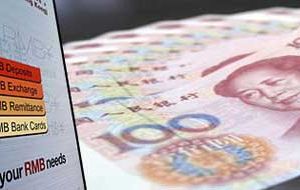MercoPress. South Atlantic News Agency
Chinese banks may now invest in US stocks and funds
 Wall Street hopes to be flooded by billions of Yuans
Wall Street hopes to be flooded by billions of Yuans Chinese banks may now invest their clients' money in United States stocks and mutual funds, China's banking regulator has said allowing them to diversify their portfolios at a time of increasing market volatility. The decision announced this week is also expected to help ease inflationary pressures in the world's fastest growing economy.
In a statement on its website the Chinese Banking Regulatory Commission, CBRC, said it had recently signed an agreement with the US Securities and Exchange Commission, paving the way for Chinese banks to invest in US shares and SEC-approved funds. The move had long been anticipated by CBRC. The United States joins Hong Kong, Britain, Japan and Singapore as potential investment destinations for Chinese banks' funds under the so-called Qualified Domestic Institutional Investor, QDII scheme. However the agency did not mention how much money might flow into US capital markets as a result of the agreement. At the end of 2007, 16 banks were offering 262 QDII funds into which investors had put 41.4 billion Yuan and 1.2 billion US dollars, most of which apparently was invested in Hong Kong. China's booming economy, which expanded at its fastest pace in 13 years in 2007, has attracted investors from abroad who are eager to cash in on China's growing number of wealthy citizens, resulting in a build-up in the country's foreign exchange reserves. Faster growth has also fuelled demand for food and other consumer products, pushing inflation to its highest level in nearly 12 years. To date, there are 23 Chinese commercial banks that have been granted licenses to invest their clients' money overseas, according to the official Xinhua news agency. The scheme could be extended to Germany and in a near future to emerging markets as well. The initial reception to QDII, introduced in April 2006, was muted as investors preferred to keep their money at home in a booming stock market and a rising currency. But the main stock index, the Shanghai Composite, is down 41% from a record peak hit last October, giving Chinese residents more of an incentive to put their money elsewhere. In spite of the enthusiasm about the latest decision some analysts remain cautious, saying China's move to allow its lenders to invest in the United States came at the wrong time, considering that most investors would be wary about putting their money in the U.S. markets at the moment. Losses incurred by some QDII funds last year and the Yuan's appreciation against the US dollar may also keep Chinese citizens from investing in the US. While it will be cheaper for Chinese citizens to buy U.S. assets because of the strong Yuan, they may lose some money once they convert heir dollars back into the local currency. The Yuan has risen more than 4% this year against the dollar. It is currently at its strongest level of 7 to the greenback since Chinese authorities abandoned the Yuan's peg to the U.S. dollar in July 2005.




Top Comments
Disclaimer & comment rulesCommenting for this story is now closed.
If you have a Facebook account, become a fan and comment on our Facebook Page!